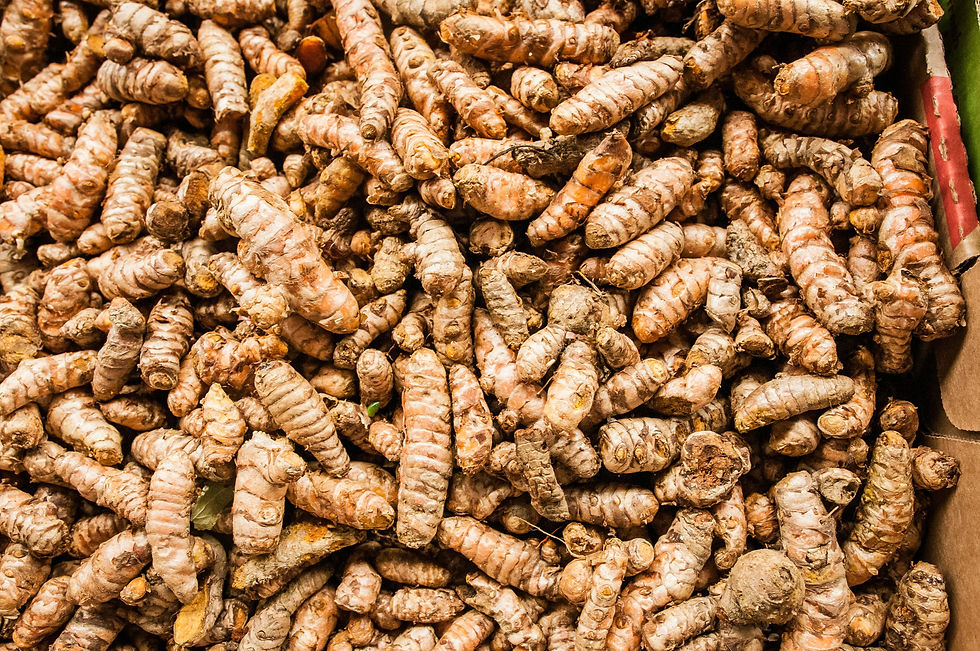Turmeric: A Nutrient for Resilience & Support
- Healthy Mays
- Oct 29, 2024
- 4 min read
Updated: Jan 19

In recent years, #turmeric has emerged from a staple culinary spice to a scientifically promising nutrient in the field of oncology. #Curcumin, its primary active compound, has demonstrated powerful anti-inflammatory, #antioxidant, and cellular-regulating properties that make it a potentially useful part of integrative cancer care approaches.
Curcumin: The Active Component and Its Mechanisms in Cancer Care
Curcumin has shown potential to support cancer care through various mechanisms that could enhance patient resilience and mitigate treatment-related side effects:
Anti-Inflammatory Actions: Chronic inflammation is closely linked to increased cancer risk and progression. Curcumin has demonstrated the ability to inhibit inflammatory pathways, reducing key inflammatory molecules such as #cytokines and COX-2 enzymes. This #antiinflammatory effect may help slow tumour growth and reduce pain associated with inflammation (Aggarwal et al., 2013; Gupta et al., 2014).
Antioxidant Properties: Oxidative stress damages cells, fostering an environment for cancer to develop and progress. Curcumin is a potent antioxidant, effectively neutralizing #freeradicals and boosting the body’s natural antioxidant defences. This property becomes particularly relevant in cancer treatment, as therapies like chemotherapy and radiation increase oxidative stress, which curcumin may help counterbalance (Reuter et al., 2010; Heger et al., 2013).
Apoptosis and Cell Cycle Regulation: Cancer cells often evade programmed cell death, or apoptosis, which enables them to multiply uncontrollably. Curcumin has shown the potential to induce apoptosis in cancer cells and regulate cell cycle checkpoints, potentially inhibiting tumour growth while leaving healthy cells unaffected (Pawar et al., 2016; Shanmugam et al., 2015).
Modulation of Gut Health and Immunity: Gut health and immunity are increasingly recognized as vital factors in cancer care. Research shows that curcumin can positively influence the #gutmicrobiome, which in turn supports #immunefunction. This is especially significant for cancer patients whose immune systems & gut microbiome are often compromised by treatment (Tindall et al., 2018; White et al., 2019).
Modulation of Cancer Stem Cells: Emerging research indicates that curcumin may also target cancer stem cells, which are often resistant to conventional therapies and contribute to recurrence. By inhibiting the self-renewal and proliferation of these cells, curcumin may help improve treatment outcomes and reduce the likelihood of cancer recurrence (Subramaniam et al., 2016; Prasad et al., 2018).

Human Studies: Curcumin in Clinical Cancer Research
In clinical studies, curcumin has shown potential benefits across various types of cancer, notably colorectal, breast, and pancreatic cancers. For example, in patients with advanced colorectal cancer, those who supplemented with curcumin alongside standard treatment protocols showed improved outcomes compared to those on conventional treatment alone (Kanai et al., 2011). Breast cancer cell studies also highlight curcumin’s potential in inhibiting cancer cell growth and improving the efficacy of chemotherapy (Hu et al., 2013).
However, the impact of curcumin is closely tied to its bioavailability. Traditional turmeric or curcumin powder has low absorption in the body, which limits its efficacy without specialized formulations (Anand et al., 2007).
Integrating Turmeric into Cancer Support Plans
For those considering turmeric as part of a cancer care plan, it’s essential to work closely with a registered nutritionist trained in cancer care, such as myself, to ensure there are no interactions with individual conventional medical treatment plans. While turmeric and its active component, curcumin, are not standalone treatments, they may offer significant complementary support, especially when formulated for optimal absorption. I like Kurk as a great brand of high quality turmeric in liquid form with enhanced absorption. IV turmeric is also a recommended option via a registered experienced clinic who can administer it.
In conclusion, turmeric offers powerful potential within cancer care as a nutrient that supports inflammation reduction, anti-oxidative activity, immune health, and overall well-being.
If you’d like 1-1 #nutritionaltherapy to support your #nutrition alongside cancer care or gut health, #hormonebalancing, or #livercleansing, then please DM me to find out more and book in for a discovery call to learn about my 1-1 3-month life-changing nutrition packages. As a registered #functionalmedecine trained #nutritionist & #naturopath, with further training in nutrition for cancer care, I would love to support you. www.healthymays.com/consultations.

References
Aggarwal, B. B., & Sung, B. (2013). Pharmacological basis for the role of curcumin in chronic diseases: an age-old spice with modern targets. Trends in Pharmacological Sciences, 34(4), 152-159.
Anand, P., Kunnumakkara, A. B., Newman, R. A., & Aggarwal, B. B. (2007). Bioavailability of curcumin: Problems and promises. Molecular Pharmaceutics, 4(6), 807-818.
Gupta, S. C., Patchva, S., & Aggarwal, B. B. (2014). Therapeutic roles of curcumin: lessons learned from clinical trials. AAPS Journal, 15(1), 195-218.
Heger, M., Van Golen, R. F., Broekgaarden, M., & Michel, M. C. (2013). The molecular basis for the pharmacokinetics and pharmacodynamics of curcumin and its metabolites in relation to cancer. Pharmacological Reviews, 66(1), 222-307.
Kanai, M., Yoshimura, K., Asada, M., Imaizumi, A., Suzuki, C., Matsumoto, S., … & Nishihira, J. (2011). A phase I study of curcumin, a chemopreventive agent, in patients with high-risk or pre-malignant lesions. Cancer Prevention Research, 4(3), 354-362.
Pawar, V. M., Gopalakrishnan, C., Venkataraman, S., & Niranjan, G. (2016). Apoptosis in cancer cells: Promising mechanism of curcumin to combat cancer. Frontiers in Pharmacology, 7, 440.



Comments